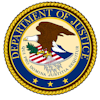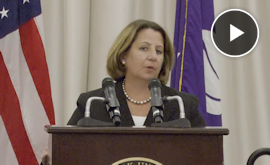|
DOJ Evaluating The Strength of a Company’s Compliance Program - Compensation Tie
In & Self-Disclosure
Your Boards Should Be Aware - As Compliance Programs Go Under Magnifying Glass
Deputy Attorney General Lisa O. Monaco Delivers Remarks on Corporate Criminal
Enforcement
New York City, NY ~ Thursday, September 15, 2022 - At NYU
It all comes back to corporate culture.
 Last
October, I announced immediate steps the Justice Department would take to tackle
corporate crime. I also formed the Corporate Crime Advisory Group, a group of
DOJ experts tasked with a top-to-bottom review of our corporate enforcement
efforts. Comprised of a group of experts including public interest groups,
ethicists, academics, audit committee members, in-house attorneys, former
corporate monitors, and members of the business community and defense bar. Last
October, I announced immediate steps the Justice Department would take to tackle
corporate crime. I also formed the Corporate Crime Advisory Group, a group of
DOJ experts tasked with a top-to-bottom review of our corporate enforcement
efforts. Comprised of a group of experts including public interest groups,
ethicists, academics, audit committee members, in-house attorneys, former
corporate monitors, and members of the business community and defense bar.
Our meetings sparked discussions on
individual accountability and corporate responsibility;
on predictability and transparency; and on the ways enforcement policies must
square with the realities of the modern economy.
First, I’ll reiterate that the Department’s
number one priority is individual accountability.
Second, I’ll discuss our approach to companies with a history of misconduct.
 Third,
I’ll highlight
new Department policy on voluntary self-disclosures,
including the concrete and positive consequences that will flow from
self-disclosure.
We expect good companies to step up and own up to misconduct.
Voluntary self-disclosure is an indicator of a working compliance program and a
healthy corporate culture. Third,
I’ll highlight
new Department policy on voluntary self-disclosures,
including the concrete and positive consequences that will flow from
self-disclosure.
We expect good companies to step up and own up to misconduct.
Voluntary self-disclosure is an indicator of a working compliance program and a
healthy corporate culture.
Fourth, I’ll detail when
compliance monitors
are appropriate and how we can select them equitably and transparently.
Finally, I’ll discuss how the Department
will encourage companies to shape financial compensation around promoting
compliance and avoiding improperly risky behavior.
These steps include rewarding companies that claw back compensation from
employees, managers, and executives when misconduct happens. No one should have
a financial interest to look the other way or ignore red flags. Corporate
wrongdoers—rather than shareholders—should bear the consequences of misconduct.
&uuid=(email))
Individual Accountability
Let me start with our top priority for corporate criminal enforcement: going
after individuals who commit and profit from corporate crime.
In the last year, the Department of Justice has secured notable trial victories,
including convictions of the founder and chief operating officer of Theranos;
convictions of J.P. Morgan traders for commodities manipulation; the conviction
of a managing director at Goldman Sachs for bribery; and the first-ever
conviction of a pharmaceutical CEO for unlawful distribution of controlled
substances.
Despite those steps forward,
we cannot ignore the data showing overall decline in corporate criminal
prosecutions over the last decade. We need to do more and move faster.
So, starting today, we will take steps to empower our prosecutors, to clear
impediments in their way, and to expedite our investigations of individuals.
To do that, we will require cooperating companies to come forward with important
evidence more quickly.
Sometimes we see companies and counsel elect—for strategic reasons—to delay the
disclosure of critical documents or information while they consider how to
mitigate the damage or investigate on their own. Delayed disclosure undermines
efforts to hold individuals accountable. It limits the Department’s ability to
proactively pursue leads and preserve evidence before it disappears. As time
goes on, the lapse of statutes of limitations, dissipation of evidence, and the
fading of memories can all undermine a successful prosecution.
In individual prosecutions, speed is of the essence.
History of Misconduct
Now, it’s safe to say that no issue garnered more commentary in our discussions
than the commitment we made last year to consider the full criminal, civil, and
regulatory record of any company when deciding the appropriate resolution.
That decision was driven by the fact that between 10% and 20% of large corporate
criminal resolutions have involved repeat offenders.
In response to that feedback, today, we are releasing additional guidance about
how such histories will be evaluated.
Voluntary Self-Disclosure
That said, the clearest path for a company to avoid a guilty plea or an
indictment is voluntary self-disclosure. The Department is committed to
providing incentives to companies that voluntarily self-disclose misconduct to
the government. In many cases, voluntary self-disclosure is a sign that the
company has developed a compliance program and has fostered a culture to detect
misconduct and bring it forward.
Our goal is simple: to reward those companies whose historical investments in
compliance enable voluntary self-disclosure and to incentivize other companies
to make the same investments going forward.
We also want to clarify the benefits of promptly coming forward to self-report,
so that
chief compliance officers, general counsels, and others can make the case in the
boardroom that voluntary self-disclosure is a good business decision.
&uuid=(email)) So,
for the first time ever, every Department component that prosecutes corporate
crime will have a program that incentivizes voluntary self-disclosure. If a
component currently lacks a formal, documented policy, it must draft one. So,
for the first time ever, every Department component that prosecutes corporate
crime will have a program that incentivizes voluntary self-disclosure. If a
component currently lacks a formal, documented policy, it must draft one.
Corporate Culture
As everyone here knows,
it all comes back to corporate culture.
In our discussions leading to this announcement, we identified encouraging
trends and new ways in which compliance departments are being strengthened and
sharpened. But resourcing a compliance department is not enough; it must also be
backed by, and integrated into, a corporate culture that rejects wrongdoing for
the sake of profit. And companies can foster that culture through their
leadership and the choices they make.
To promote that culture, an increasing number of companies are choosing to
reflect corporate values in their compensation systems.
Going forward, when
prosecutors evaluate the strength of a company’s compliance program, they will
consider whether its compensation systems reward compliance
and impose financial sanctions on employees, executives, or directors whose
direct or supervisory actions or omissions contributed to criminal conduct. They
will evaluate what companies say and what they do, including whether, after
learning of misconduct, a company actually claws back compensation or otherwise
imposes financial penalties.
I have asked the Criminal Division to develop further guidance by the end of the
year on how to reward corporations that employ clawback or similar arrangements.
This will include how to help shift the burden of corporate financial penalties
away from shareholders—who frequently play no role in misconduct—onto those more
directly responsible.
Today’s announcements are fundamentally about individual accountability and
corporate responsibility. But they are also about ownership and choice.
Companies should feel empowered to do the right thing—to invest in compliance
and culture, and to
step up and own up when misconduct occurs. Companies that do so will welcome the
announcements today. For those who don’t, however, our Department prosecutors
will be empowered, too—to hold accountable those who don’t follow the law.
justice.gov
|